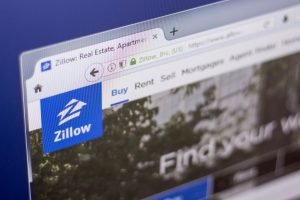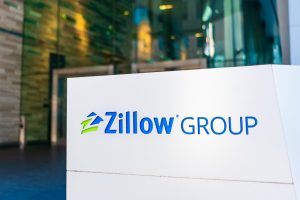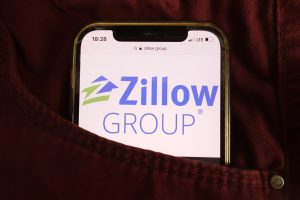Why is Zillow Free And How Does Its Website Make Money?

[mashshare]
Zillow offers users the option of listing properties for sale and renting out properties, as well as searching for properties, all free of charge. There are also mobile search tools, which allow users to find the property they want and see the estimated value of that property. So if you want to know more about this, then this blog is for you.
For today’s blog, exclusive for our Core members, we are going to talk about Zillow, why it is free, and how it truly makes money.
 Zillow is a real estate marketplace that allows users to search rental and sale listings when looking for a place to rent or buy. Zillow does not make money from the homes listed on the site but instead by offering and reselling mortgages and through enhanced profiles. People list their homes for sale or rent on Zillow and can do so without paying a fee.
Zillow is a real estate marketplace that allows users to search rental and sale listings when looking for a place to rent or buy. Zillow does not make money from the homes listed on the site but instead by offering and reselling mortgages and through enhanced profiles. People list their homes for sale or rent on Zillow and can do so without paying a fee.
Its platform comprises anything related to the purchase, sale, rental, and loan financing of a home. The company’s goal is to equip consumers with the necessary data and knowledge about anything related to homes. The company shuttered its Zillow Offers program after November 2021. They previously sold homes straight from their website through that program, though. The buyer can buy homes from the owner, or from a foreclosure. Alternatively, the buyer can contact an agent to act as a middleman between the seller and the buyer. Zillow features offer a number of services that work to make researching and applying for rental listings easier and simpler. For example, users can save time by using Zillow’s features like uploading a resume directly through the website, using the affordability calculator to decide which homes are within their price range, or paying online on the Zillow platform without having to worry about mailing in checks.
For sellers, Zillow offers three primary options. With Zestimates, homeowners can estimate the potential profit of their homes so they don’t miss out on any money. One of the ways it does this is by listing homes directly on the company’s website. Zillow will help you find professionals to work with in order to get your property sold. You don’t need to go through it alone! With their Agent Finder, you can find anyone you need for the job and their Zestimate will give detailed information on what your home is worth. Sellers can sell their house to Zillow through its Zillow Offer program, and if the offer is accepted, they are able to sell their property within a few hours for less hassle.
Sellers also receive repair coverage from the seller with this service. On the borrower side, there are a lot of options. In 2018, Zillow acquired Mortgage Lender of America to have it as part of their platform. With this acquisition, Zillow offers mortgages directly to consumers. Furthermore, it partners with other lenders to offer loans on its marketplace. Lastly, it provides various tools such as a mortgage calculator to help during the loan application process.
The company is powered by advertising, where property managers and real estate agents buy ads to be featured on the site, and also incentive services are offered to agents who use the website as a marketing tool. Zillow was founded in 2004 by Rich Barton, who is CEO of Zillow. Barton is a tier one tech entrepreneur in his day and age. He graduated from Stanford in the late Eighties and worked in two consulting roles before McBridge offered him a job. He moved to Seattle to continue his work at Microsoft in 1991. In 1994, the company was planning on entering the travel industry by creating a travel guide that would be distributed via CD-ROM. However, until Barton chipped in and said no.
At the time, HTML-based services specifically designed for travel agents were beginning to take off. They allowed them to essentially work from home while expanding their sales reach. Barton felt that this would be a much larger opportunity for Microsoft. He pitched his website to Bill Gates and Steve Ballmer. They agreed to fund his project, which launched on the web in 1996 as Expedia.com. The success of Expedia surprised everyone. Two years after the company was created in 1994, it was spun off from Microsoft. This happened because interest in this company continued to grow rapidly throughout 1996 and 1997.
Barton’s success in leading his company through IPO propelled him to the top, and in 2003 he became a multimillionaire when IAC/InterActiveCorp paid $3.6 billion to acquire 100% of this company. That same year, Khosrowshahi was hired by Expedia and continued to serve as CEO for the next fourteen years. He later left in 2017 to become the CEO of Uber.
 The other staff includes Lloyd Frink and Spencer Rascoff, who are both former Microsoft executives. David Beitel, Kristin Acker, and Rascoff were all involved in founding Expedia with Rascoff being the co-founder of Hotwire.com. Zillow primarily advertises on their website, but in the past, they worked with local newspapers to co-branded sites. Zillow can also provide an integrated real estate experience by helping customers buy, sell or rent homes. They have partnerships with banks so they can offer home loans as well. In 2021, they shut down their program to directly buy and sell homes after suffering significant losses. With data on over 110 million homes in the US, Zillow has proprietary algorithms that provide value-added insight including Zestimate, a home valuation model that estimates a home’s value by looking at public and user-submitted data as well as its MLS listing and other location and market trends.
The other staff includes Lloyd Frink and Spencer Rascoff, who are both former Microsoft executives. David Beitel, Kristin Acker, and Rascoff were all involved in founding Expedia with Rascoff being the co-founder of Hotwire.com. Zillow primarily advertises on their website, but in the past, they worked with local newspapers to co-branded sites. Zillow can also provide an integrated real estate experience by helping customers buy, sell or rent homes. They have partnerships with banks so they can offer home loans as well. In 2021, they shut down their program to directly buy and sell homes after suffering significant losses. With data on over 110 million homes in the US, Zillow has proprietary algorithms that provide value-added insight including Zestimate, a home valuation model that estimates a home’s value by looking at public and user-submitted data as well as its MLS listing and other location and market trends.
Barton, after a year’s break, is looking for new opportunities. He cites two features that he looks at when starting or investing in a business: Information asymmetries in the market, such as a lack of transparency or hardly accessible and unreliable data, and the ability to have users generate the content themselves, which accelerates the company’s flywheel effect. He used this mantra when he first started Expedia (prices for trips were highly untransparent with travel agents pocketing high markup fees) and became one of the main investors in companies like Glassdoor or Nextdoor. The passion and creativity he brought to his successes would help him launch Zillow in 2005. Barton was trying to buy a new home around the same time as Lance.
When they looked for public housing data, they found it difficult to find, because it was stored in different archives around both the web and government bureaus. They also encountered real estate agents who maximize their profits by not giving them the same offer for the property. With that in mind, the team got to work. They hired Stan Humphries, the spearheading Expedia’s analytics division, to lead its algorithm teams. His team spent months collecting housing data from a variety of data sources and digitizing it, then made it publicly available on Zillow’s website. The other key hire is Spencer Rascoff, a Harvard graduate who co-founded Hotwire in 1999 and sold it to IAC, the same company Expedia got acquired by.
He stayed for close to two years before being brought onto Expedia as well. To get a nice head start, Barton and the team received $32 million in backing from two venture-capital firms, Benchmark Capital and Technology Crossover Ventures. This allowed them to hire 75 employees and refine the product, which launched into beta in February 2006. When users first saw Zillow, they immediately stormed their website. This site even caused over two million people to visit within the first two days, which actually crashed their site. The reason? This new feature is called Zestimate, which allows you and other users to assess how much a house is worth.
The American housing market in the mid 2000s had never been as good as it was then, and that caused people to go crazy and buy more houses than they really needed. This resulted in the financial crisis of 2008. Zillow launched right into that mania with a $32 million war chest and an extraordinary management team. But access to capital and reputation weren’t the only factors driving the company’s growth. Zestimates is a controversial feature, which was created to spark word-of-mouth and drive growth. The feature does this by being publicly visible for homeowners – where their home values are available to the public. The increase in demand was swiftly and appropriately reacted to, allowing the company to grow faster.
Zillow launched its iPhone app in 2009, only one year after the first iPhone was introduced. The company hired a new, exclusively focused iOS development team to expedite the process. This new team developed the iOS app and within one year it had already led to 20% of all Zillow users being on the app. Third, Zillow realized how important its data was. Early on, it partnered with various media outlets across the country, to gain insights into housing prices in a given city and other real estate related data. This helped it get valuable links and frequent news coverage across the country. Fourth, the company closed partnerships with other large businesses to have its advertisements displayed. One of these partnerships was with Yahoo Real Estate.
 With this partnership, Zillow also had all their listings on that site come from its website. A recession in 2008 did not have a lasting impact on the company. While they had to lay off 25% of their workforce (out of 155 employees), they quickly recovered, ending the year with 246 employees. In the years prior, people were flocking to the website to see their home prices go up. During the crisis, users would visit Zillow to get a reliable estimate to quickly sell off their homes. In the years that followed, the company continued to grow at exponential rates. The IPO led to the company raising 69 million dollars, and a valuation of $540 million. The company was already the third-most visited real estate website in the United States, counting 20 million visitors per month by that time.
With this partnership, Zillow also had all their listings on that site come from its website. A recession in 2008 did not have a lasting impact on the company. While they had to lay off 25% of their workforce (out of 155 employees), they quickly recovered, ending the year with 246 employees. In the years prior, people were flocking to the website to see their home prices go up. During the crisis, users would visit Zillow to get a reliable estimate to quickly sell off their homes. In the years that followed, the company continued to grow at exponential rates. The IPO led to the company raising 69 million dollars, and a valuation of $540 million. The company was already the third-most visited real estate website in the United States, counting 20 million visitors per month by that time.
Meanwhile, Barton was enjoying the party from the outside. He stepped down from his CEO role in 2010 and handed over the reins to Rascoff. Before becoming CEO, Rascoff served as COO of the company overseeing marketing, finance, partner relations, legal, and human resources. Despite Zillow’s continuous growth, the company faced challenges such as lawsuits from employees and competitors. These conflicts eventually led to job cuts in 2014 and the company refocused on its rental business. Many people are suing Zillow, claiming that their home was undervalued and harder to sell because the company did not take it into account. They also allege sexual harassment by a sales manager in their Irvine office.
One of the largest cases that Zillow faced was when its competitor, Move Inc., alleged that two of its executives had left and conspired against them by leaking details about all of the company’s data to Zillow. The case was settled for $130 million, but Zillow admitted no wrongdoing. While others fight over the $2 million American real estate industry, Zillow deals with other competitors in its own way. While Realtor.com and Redfin have been noted, Zillow deals with other upstarts such as Opendoor and Offerpad. Zillow’s competitor, Trulia, was founded a year after Zillow and based out of San Francisco. It challenged Zillow for the most part and attracted more customers than Zillow. Former CEO Pete Flint took criticism from Zillow due to their service being better than the latter. Zillow, on the other hand, hit Trulia with a patent infringement lawsuit in 2012 when it claimed that the company ripped off its Zestimates tool when it launched Trulia Estimates in 2011.
 However, it came as somewhat of a surprise when, in 2014, Zillow announced it would acquire Trulia for $3.5 billion in an all-stock deal. The primary goal of the acquisition was to tap into Trulia’s user base while decreasing the marketing spending that is used to fight it. Zillow had made similar acquisitions. In 2019, the company that has been led by Rascoff for almost a decade stepped down from his position as CEO and handed over the reins to Rich Barton once again- and this is evident in their recent moves away from being just an online player and towards investment in real estate. Zillow began buying and flipping homes in Phoenix and Las Vegas. These companies are using a model known as “iBuyer” which has been adopted by other startups like Opendoor.
However, it came as somewhat of a surprise when, in 2014, Zillow announced it would acquire Trulia for $3.5 billion in an all-stock deal. The primary goal of the acquisition was to tap into Trulia’s user base while decreasing the marketing spending that is used to fight it. Zillow had made similar acquisitions. In 2019, the company that has been led by Rascoff for almost a decade stepped down from his position as CEO and handed over the reins to Rich Barton once again- and this is evident in their recent moves away from being just an online player and towards investment in real estate. Zillow began buying and flipping homes in Phoenix and Las Vegas. These companies are using a model known as “iBuyer” which has been adopted by other startups like Opendoor.
In 2020, it became a particularly successful year for the company. Work-from-home orders forced employees across the world to reconsider their living situations and find something more accommodating. Furthermore, low interest rates and government stimulus checks gave an even greater amount of consumers access to cheap capital. Zillow announced in September 2020 that it would open a licensed brokerage to help buyers and sellers. They plan to hire licensed real estate agents who will boost their efficiency within the home buying business. Zillow has been in the real estate industry for a long time and has not considered changing its business model to compete directly with one of its customers. Recently, there has been a lot of discussion about the company’s ethics.
Many real estate agents are concerned that Zillow is hypocritical because they have stated they will never become brokers. Zillow made a significant investment in real estate and got hurt because of it. In November 2021, Zillow announced that they were shutting down their home buying division (alongside a $540 million charge), while laying off 2,000 employees. Weeks prior, the company had already stopped purchasing additional homes due to a labor shortage and backlog of unfinished repairs. Today, Zillow’s business entities, in combination, are the most frequented real estate websites in North America. The company employs over 5,000 people across 35 offices in the United States and Canada.
While Zillow started in the US, in 2018, it expanded to Canada. They own a number of companies including:
- Postlets: an online real estate listing platform
- RentJuice: a SaaS company that offers tools for marketing and leasing rental properties
- Buyfolio: a real estate shopping platform
Apart from its own set of products and services, Zillow has acquired over 12 businesses in its company history. Some of these companies remain to be standalone entities, which simply complement Zillow’s portfolio of real estate products. They also own Mortech, HotPads, StreetEasy, Trulia, DotLoop, Naked Apartments, and Showing Suite.
Zillow’s public company status was established in 2011, and the company trades on the NASDAQ with the (Z) ticker symbol. But the majority of ownership stakes still lie in those of the executive leaders and early investors. Zillow has several brands that help consumers in various aspects of their home-buying and renting experiences, including Zillow Offers, Zillow Premier Agent, Zillow Home Loans, Zillow Closing Services, Zillow Homes, Trulia, Out East, StreetEasy, HotPads, and ShowingTime. In 2020, Zillow sold 5.3 million homes, with a revenue of $3.33 billion in that year alone, an increase from $2.74 billion from the prior year and representing a 22% annual increase in revenue. With 9.6 billion visits to their website and apps, Zillow had a record for 2020. Zillow lost $162 million in that year though, at the time of writing this article 2021 annual data has not yet been released.
Zillow’s competitive advantage is its popularity and trusted reputation. They provide extra value to the user with their algorithms, such as the Zestimate tool they have that calculates the estimated selling price of a house. Zillow has several competitors in the online residential real estate space including Redfin, Homesnap, Realtor.com, Apartments.com, and Open Door.
 Zillow makes money in many ways. The first one is the Zillow Offers. Zillow has been introducing Zillow Offers for the past few years. It’s a system designed to make it easier for homeowners to sell their homes by delivering an online offer marketing campaign. With “sponsored” listings, there’s generally a one-time fee in exchange for being featured prominently on a local map and in searches. In 2020, Zillow Offers yielded $1.7 billion in revenue, with 51% of that coming from their 3-line offshoot project. Then they have a premier agent. Zillow makes its money by offering services to real estate agents. This can include ongoing support and targeted advertising.
Zillow makes money in many ways. The first one is the Zillow Offers. Zillow has been introducing Zillow Offers for the past few years. It’s a system designed to make it easier for homeowners to sell their homes by delivering an online offer marketing campaign. With “sponsored” listings, there’s generally a one-time fee in exchange for being featured prominently on a local map and in searches. In 2020, Zillow Offers yielded $1.7 billion in revenue, with 51% of that coming from their 3-line offshoot project. Then they have a premier agent. Zillow makes its money by offering services to real estate agents. This can include ongoing support and targeted advertising.
Agents can choose to create a free profile, or they may decide to use more expensive options in order to have the best tools available for converting leads into clients. In 2020, Zillow made $1.04 billion from fees charged to agents for their Premier agents’ services, a 14% increase year over year, and an additional $403 million from agent advertising sales. Combined, this made up 43% of Zillow’s 2020 revenue. They also earn through mortgage origination. Zillow earns money when they offer Zillow Home Loans and resell them on the secondary mortgage market. They also are an option in providing mortgage refinancing.
The company’s mortgage origination services are primarily geared toward sellers and home buyers who use their website. They made $174 million in 2020 in their mortgage origination division, an increase of 73% over 2019. However, that revenue represented just 5% of their total revenue in 2020.
That’s it for this blog CORE Member. What do you think of the tips we’ve shared? Let us know in the comments below. And don’t forget to subscribe to our channel, click the notification bell, and like this blog. If you think that we have delivered value please share this blog with one person. Just one share is enough for us, for you to show your appreciation for the commitment and hard work we all put together in creating this blog that teaches and helps you on your mission of building your own fortune. And you don’t know that one share could go a long way. And keep in mind that no matter how many times you’re going to read this blog, you won’t see any results unless you take action. Goodbye and see you at the next one!
[mashshare]





